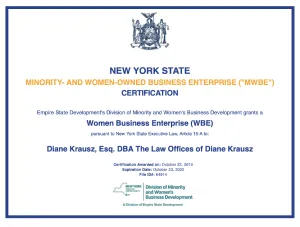Your Strong Advocate Behind the Scenes
Representing artists for more than 30 years
You work hard perfecting your art and promoting your talents. In the competitive culture of the entertainment industry, success also requires in-depth business aptitude, strong negotiating skills and precise legal knowledge. As you concentrate on your artistic development, Diane Krausz can handle the crucial legal and business aspects of your art. She has committed more than 30 years to assisting artists with:
- Contract negotiations and drafting
- Disputes
- Licensing and Merchandising
Special Areas of Expertise:
- Minors in entertainment
- Theatre and live performances
- Independent film
Beyond your business
In addition to promoting your work and developing your financial security, Diane employs her in-depth legal knowledge and extensive business and negotiating skills to assisting artists with their other legal needs, including:
- Literary Rights
- General business matters
- Trusts and Estates
- Real estate transactions
We are proud to introduce the most recent publication that we co-edited, Siegel on Entertainment Law, is now available at https://nysba.org/products/siegel-on-entertainment-law-ebook/
Call The Law Offices of Diane Krausz at 212.244.5292 or contact the firm online to schedule an appointment.








